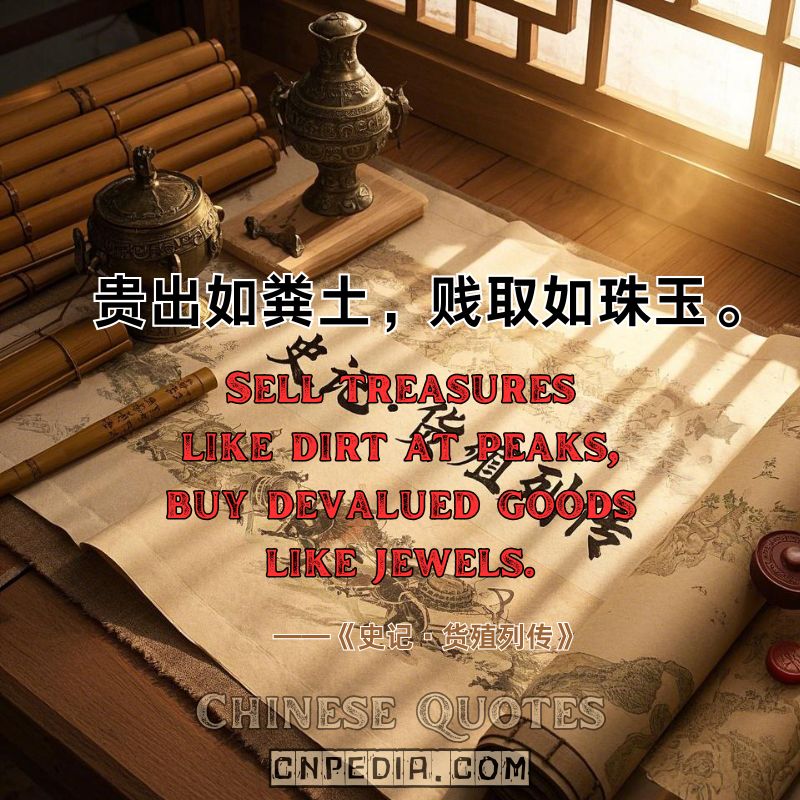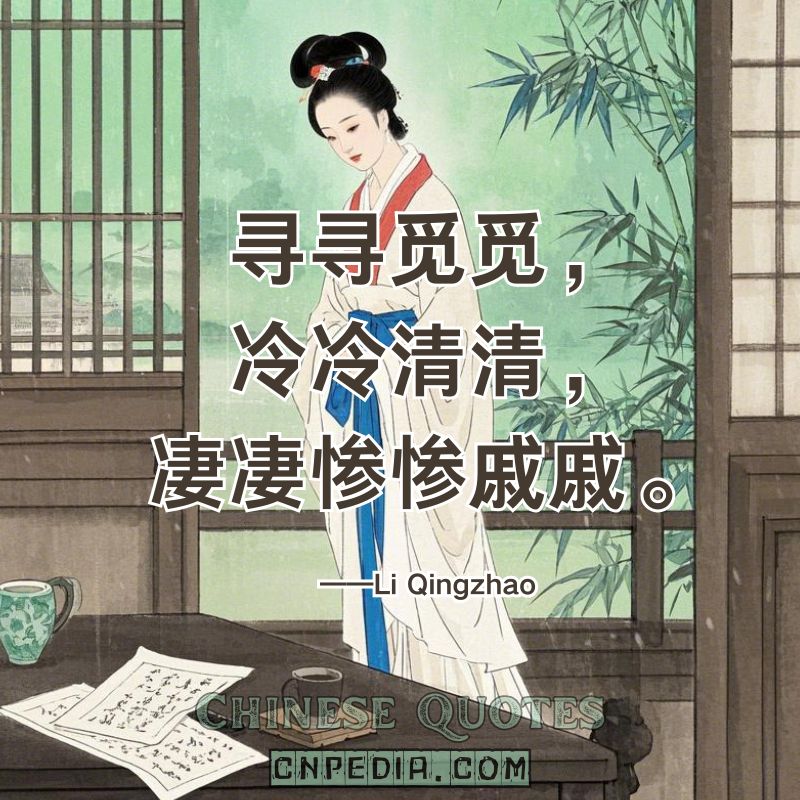
“旱则资舟,水则资车。” Pinyin: Hàn zé zī zhōu, shuǐ zé zī chē.Translation: “Invest in boats during droughts; stock carts during floods.”Source: 《史记·货殖列传》 (Shǐ Jì · Huò Zhí Liè Zhuàn, Records of the Grand Historian: Biographies of the Money-makers)Explanation: Anticipates future scarcity through contrarian preparation.

“贵出如粪土,贱取如珠玉。” Pinyin: Guì chū rú fèn tǔ, jiàn qǔ rú zhū yù.Translation: “Sell treasures like dirt at peaks; buy devalued goods like jewels.”Source: 《史记·货殖列传》 (Shǐ Jì · Huò Zhí Liè Zhuàn, Records of the Grand Historian: Biographies of the Money-makers)Explanation: Advocates disciplined market timing: sell high, buy low .

Explore the beauty of ancient Chinese poetry with CNPedia’s new collection: 50 Illustrated Quotes by Li Qingzhao. Known as one of China’s greatest poets from the Song Dynasty, her heartfelt words about love, loss, and courage now come alive in English and Chinese. Each quote is paired with colorful image, easy-to-read translations, and clear explanations to help you understand her timeless messages. Whether you’re learning Chinese classics, studying poetry, or just love art, CNPedia makes it simple to connect with her work. Dive into famous lines like “Seeking, searching, lost and lonely” and discover why her poetry still moves people today—all in one bilingual, visually stunning guide. 1. “寻寻觅觅,冷冷清清,凄凄惨惨戚戚。” Pinyin: Xún xún mì mì, lěng lěng qīng qīng, qī qī...

“凉生枕簟泪痕滋,起解罗衣聊问夜何其。”Pinyin: Liáng shēng zhěn diàn lèi hén zī, qǐ jiě luó yī liáo wèn yè hé qí.Translation: “Coolness seeps through the mat, tears stain—rising to undress, I ask how late the night is.”Source: Southern Song · Stars Shift (《南歌子·天上星河转》, Nán Gē Zǐ · Tiān Shàng Xīng Hé Zhuǎn)Explanation: Nocturnal solitude; existential questioning in mundane acts.

“翠贴莲蓬小,金销藕叶稀。”Pinyin: Cuì tiē lián péng xiǎo, jīn xiāo ǒu yè xī.Translation: “Jade adorns tiny lotus pods; gold fades on sparse leaves.”Source: Southern Song · Stars Shift (《南歌子·天上星河转》, Nán Gē Zǐ · Tiān Shàng Xīng Hé Zhuǎn)Explanation: Decay of opulence; material transience symbolism.

“眠沙鸥鹭不回头,似也恨、人归早。”Pinyin: Mián shā ōu lù bù huí tóu, sì yě hèn, rén guī zǎo.Translation: “Gulls on sand sleep, heads unturned—as if they resent our early return.”Source: (《怨王孙·湖上风来波浩渺》, Yuàn Wáng Sūn · Hú Shàng Fēng Lái Bō Hào Miǎo)Explanation: Nature’s indifference to human schedules; eco-poetic critique.

“莲子已成荷叶老,清露洗、蘋花汀草。”Pinyin: Lián zǐ yǐ chéng hé yè lǎo, qīng lù xǐ, pín huā tīng cǎo.Translation: “Lotus seeds ripe, leaves aged—dew cleanses duckweed and marsh grass.”Source: (《怨王孙·湖上风来波浩渺》, Yuàn Wáng Sūn · Hú Shàng Fēng Lái Bō Hào Miǎo)Explanation: Autumn’s quiet productivity; senescence

“看取晚来风势,故应难看梅花。”Pinyin: Kàn qǔ wǎn lái fēng shì, gù yīng nán kàn méi huā.Translation: “Observe the evening wind’s force—plum blooms will surely suffer.”Source: Pure Serene Music · Eternal Regret (《清平乐·年年雪里》, Qīng Píng Yuè · Nián Nián Xuě Lǐ)Explanation: Foreboding fragility; ecological metaphor.

“今年海角天涯,萧萧两鬓生华。”Pinyin: Jīn nián hǎi jiǎo tiān yá, xiāo xiāo liǎng bìn shēng huá.Translation: “This year, at world’s end—frost streaks my temples.”Source: Pure Serene Music · Eternal Regret (《清平乐·年年雪里》, Qīng Píng Yuè · Nián Nián Xuě Lǐ)Explanation: Aging in displacement; universal exile theme.

“年年雪里,常插梅花醉。”Pinyin: Nián nián xuě lǐ, cháng chā méi huā zuì.Translation: “Yearly in snow, drunk with plum blossoms in my hair.”Source: Pure Serene Music · Eternal Regret (《清平乐·年年雪里》, Qīng Píng Yuè · Nián Nián Xuě Lǐ)Explanation: Rituals of nostalgia; cyclical time perception.
.jpg)


——Li-Qingzhao-1084-–-1155.jpg)
——Li-Qingzhao-1084-–-1155.jpg)
——Li-Qingzhao-1084-–-1155.jpg)
——Li-Qingzhao-1084-–-1155.jpg)
——Li-Qingzhao-1084-–-1155.jpg)
——Li-Qingzhao-1084-–-1155.jpg)
——Li-Qingzhao-1084-–-1155.jpg)